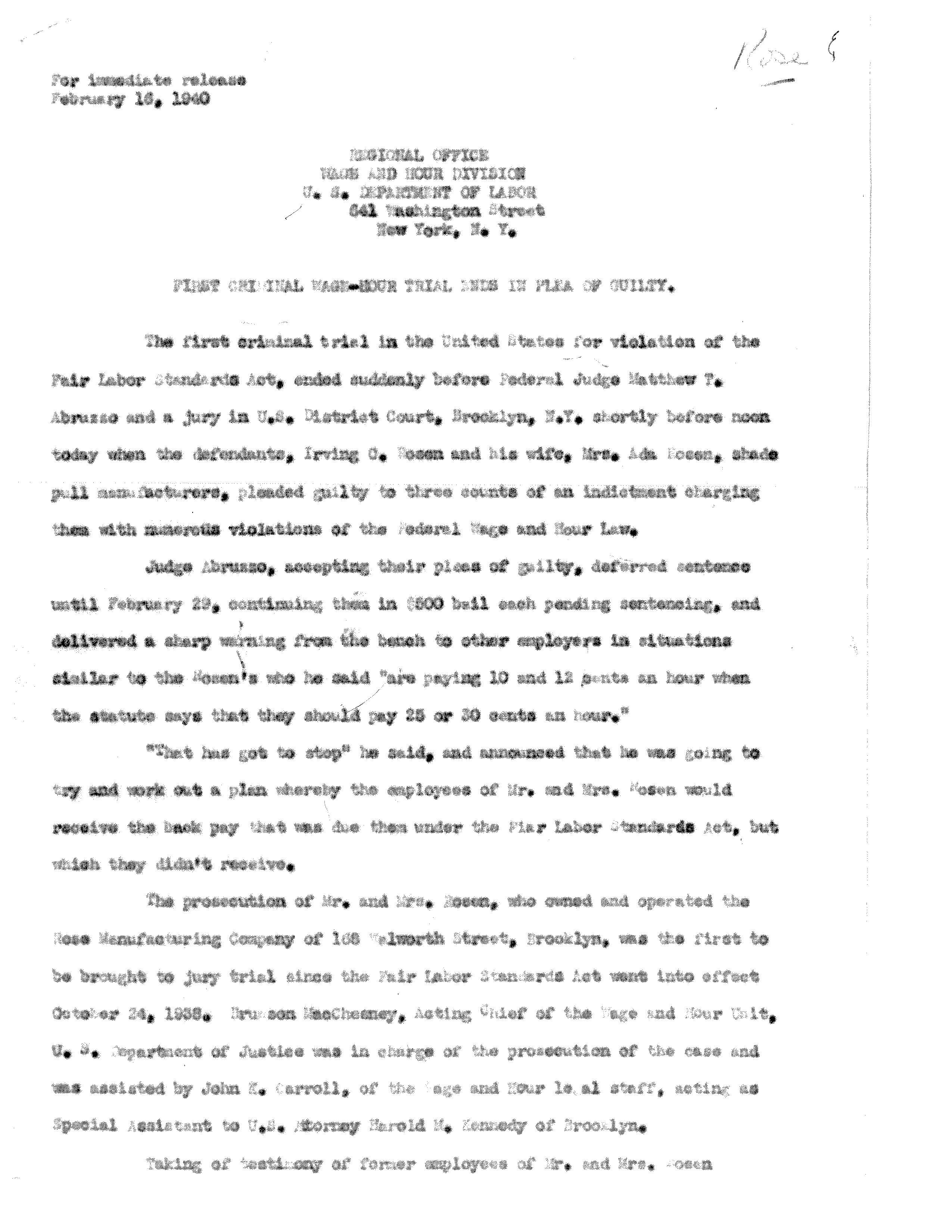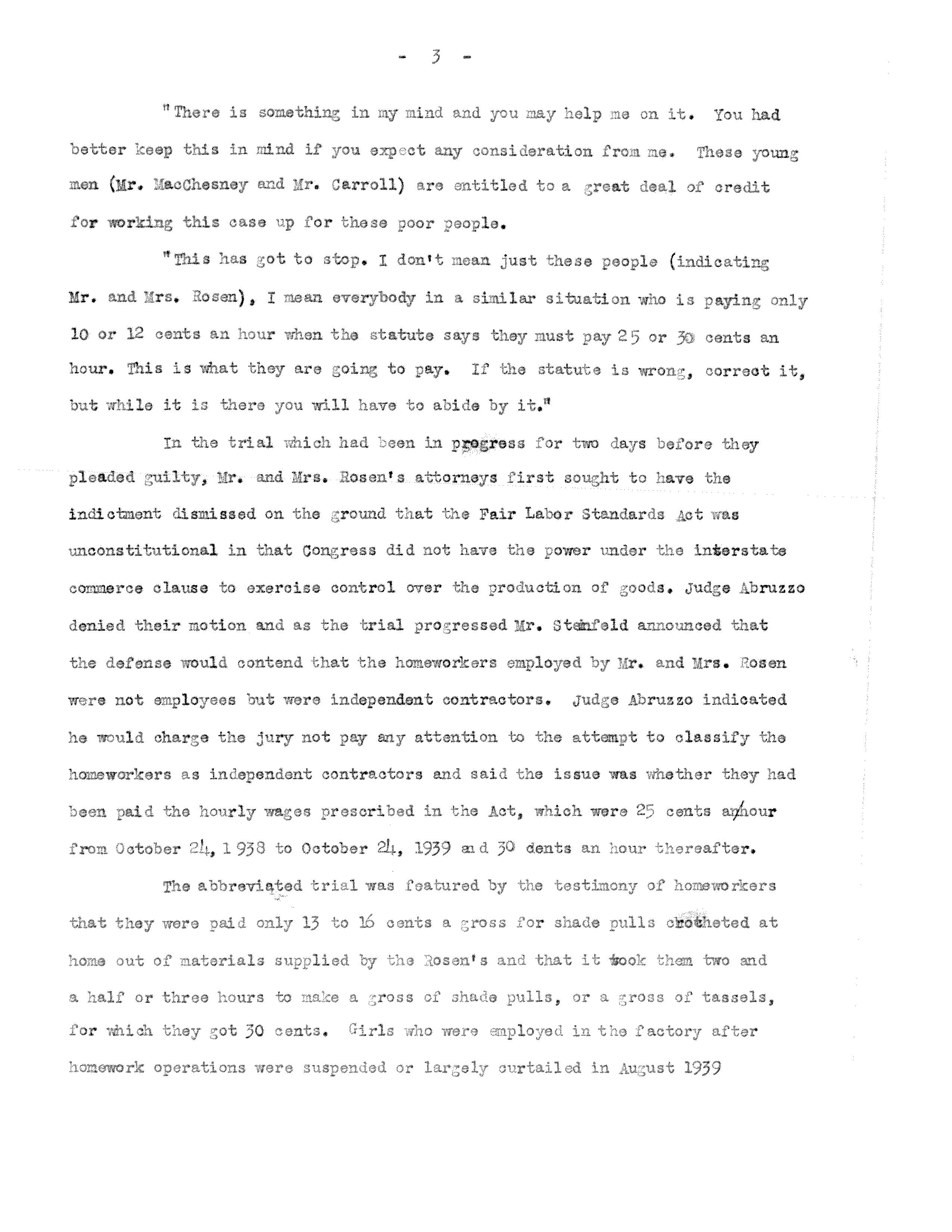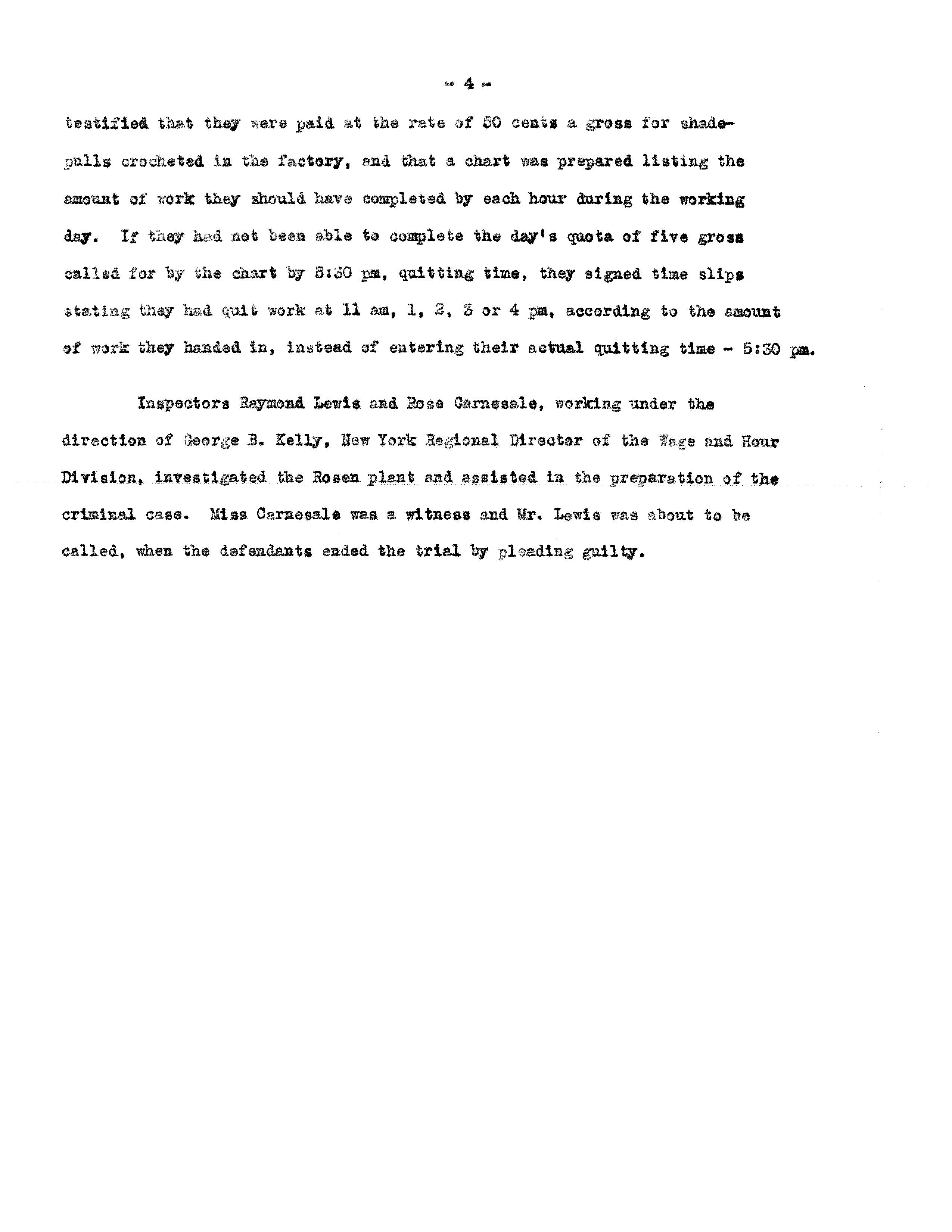
———————————————————————————————————————————————————
———————————————————————————————————————————————————

For immediate release
February 16. 1940
REGIONAL OFFICE
WAGE AND HOUR DIVISION
U. S. DEPARTMENT OF LABOR
541 Washington Street
New York, N. Y.
The first criminal trial in the United States for violation of the Fair Labor Standards Act, ended suddenly before Federal Judge Matthew T. Abruzzo and a jury in U. S. District Court, Brooklyn, N.Y. shortly before noon today when the defendants, Irving C. Rosen and his wife, Mrs. Ada Rosen, shade pull manufacturers, pleaded guilty to three counts of an indictment charging them with numerous violations of the Federal Wage and Hour law.
Judge Abruzzo, accepting their pleas of guilty, deferred sentence until February 29, continuing them in $500 bail each pending sentencing, and delivered a sharp warning from the bench to other employers in situations similar to the Rosen's who he said "are paying 10 and 12 cents an hour when the statute says that they should pay 25 or 30 cents an hour."
"That has got to stop" he said, and announced that he was going to try and work out a plan whereby the employees of Mr. and Mrs. Rosen would receive the back pay that was due them under the Fair Labor Standards Act, but which they didn't receive.
The prosecution of Mr. and Mrs. Rosen, who owned and operated the Rose Manufacturing Company of 168 Walworth Street, Brooklyn, was the first to be brought to jury trial since the Fair Labor Standards Act went into effect October 24, 1938. Brunson MacCheaney, Acting Chief of the Wage and Hour Unit, U. S. Department of Justice was in charge of the prosecution of the case and was assisted by John F. Carroll, of the Wage and Hour legal staff, acting as Special Assistant to U.S. Attorney Harold M. Kennedy of Brooklyn.
Taking of testimony of former employees of Mr. and Mrs. Rosen
[PAGE 1]
======================================================================
[PAGE 2]

[PAGE 2]
was about to be resumed when Jacob Steinfeld, attorney for the Rosen's, stepped up to the bench and announced that his client wished to plead guilty to three counts in the fourteen count indictment under which they were being tried.
The counts to which they pleaded guilty were counts 1, 8 and 11, charging failure to pay legal minimum wages to homeworkers, failure to pay the legal minimum to factory workers and falsification of records, in violation of the Act.
Summoning Mr. and Mrs. Rosen before the bench, Judge Abruzzo assured himself they understood what they were doing, and that they had nothing further to say, and then announced he would set "a special date for sentencing" February 29.
The maximum penalty to which Mr. and Mrs. Rosen are liable is a fine of $10,000 each on each count to which they pleaded guilty or a total of $30,000 each, for a first offense. A prison sentence of six months, plus a fine of $10,000 may be imposed after conviction on a second or subsequent offense, following a prior conviction under the Act.
"I want a little time to check up and work out something I have in mind" Judge Abruzzo explained in deferring sentence until February 29. "I dont know whether or not I can, but in the meantime I will send for Mr. Carroll and Mr. MacCheaney, and confer with them."
"I have in mind some kind of a situation that will work out to the benefit of all of those workers who didn't get paid what they should have. I will try to work out a situation that will be satisfactory and fair to everybody concerned. I am going to try very hard to see that these workers, these girls here, get back the money that they earned and didn't get paid."
[PAGE 2]
======================================================================
[PAGE 3]

[PAGE 3]
"There is something in my mind and you may help me on it. You had better keep this in mind if you expect any consideration from me. These young men (Mr. MacCheaney and Mr. Carroll) are entitled to a great deal of credit for working this case up for these poor people.
"This has got to stop. I don't mean just these people (indicating Mr. and Mrs. Rosen). I mean everybody in a similar situation who is paying only 10 or 12 cents an hour when the statute says they must pay 25 or 30 cents an hour. This is what they are going to pay. If the statute is wrong, correct it, but while it is there you will have to abide by it."
In the trial which had been in progress for two days before they pleaded guilty, Mr. and Mrs. Rosen's attorneys first sought to have the indictment dismissed on the ground that the Fair Labor Standards Act was unconstitutional in that Congress did not have the power under the interstate commerce clause to exercise control over the production of goods. Judge Abruzzo denied their motion and as the trial progressed Mr. Stenfeld announced that the defense would contend that the homeworkers employed by Mr. and Mrs. Rosen were not employees but were independent contractors. Judge Abruzzo indicated he would charge the jury not pay any attention to the attempt to classify the homeworkers as independent contractors and said the issue was whether they had been paid the hourly wages prescribed in the Act, which were 25 cents an hour from October 24, 1938 to October 24, 1939 and 30 cents an hour thereafter.
The abbreviated trial was featured by the testimony of homeworkers that they were paid only 13 to 16 cents a gross for shade pulls crocheted at home out of materials supplied by the Rosen's and that it took them two and a half or three hours to make a gross of shade pulls, or a gross of tassels, for which they got 30 cents. Girls who were employed in the factory after homework operations were suspended or largely curtailed in August 1939
[PAGE 3]
======================================================================
[PAGE 4]

[PAGE 4]
testified that they were paid at the rate of 50 cents a gross for shadepulls crocheted in the factory, and that a chart was prepared listing the amount of work they should have completed by each hour during the working day. If they had not been able to complete the day's quota of five gross called for by the the chart by 5:30 pm, quitting time, they signed time slips stating they had quit work at 11 am, 1, 2, 3 or 4 pm, according to the amount of work they handed in, instead of entering their actual quitting time - 5:30 pm.
Inspectors Raymond Lewis and Rose Carnesale, working under the direction of George B. Kelly, New York Regional Director of the Wage and Hour Division, investigated the Rosen plant and assisted in the preparation of the criminal case. Miss Carnesale was a witness and Mr. Lewis was about to be called, when the defendants ended the trial by pleading guilty.
[PAGE 4]